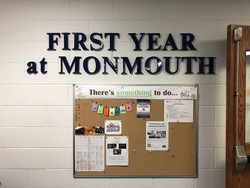Monmouth University’s Institute for Global Understanding (IGU) hosted the third event in their World Cinema Series on Wednesday, Feb 9. The theme for the series is titled, “Living on the Edge: Displacement, Identity, and Resilience.” The featured films correlate to the IGU’s overarching goal of depicting families and ethnic communities faced with war, poverty, and racism.
The central point of the virtual panel discussion was an analysis of the Japanese drama, Shoplifters, directed by Koreeda Hirokazu. The film follows an untraditional yet fiercely loyal family living on the outskirts of Tokyo who commit petty theft and crime as a means of survival. The event was hosted by Professor Thomas Pearson, PhD, who introduced the purpose of the discussion, “The film tonight gives us a new take on the whole issue of ‘living on the edge’ because it focuses on people living on the edge in their own society.”
Following this brief introduction, Pearson showed the audience the film trailer, commenting that “Koreeda very much wanted to stir up the feelings of the audience in a way that would leave them with questions.”
The conversation continued with an address by the first keynote speaker, Professor Rekha Datta, PhD. Datta, Professor of Political Science and holder of the Freed Endowed Chair in Social Sciences said, “In watching the film, the social scientist in me was very much awake…This is a film perhaps best not analyzed, just experienced and felt.”
Datta also used her expertise in social sciences to highlight some concepts that the average person may have found too subtle to notice. “The complexities of the ethics behind criminality, the characteristics of a family, and the nature of a mother were all so clearly visible when viewed from a social science perspective,” she said.
The next keynote speaker was Frank Cipriani, Professor of World Languages and Literature and Director of the Peace Corps Prep Program. As he continued the discussion’s momentum, he drew upon his career experiences, having specialized in areas of juvenile justice as well as the color, visuals, and sound of films. Cipriani’s expertise in cinematography made him keen to the film’s choices of colors and instrumental motifs. “Koreeda’s choices of color give us emotional clues as to what is being expressed in a scene,” he explained. He also pointed out key scenes in which the color of a character’s clothing or the color of the atmosphere represented different emotions. In addition to the colors in the film, Cipriani also analyzed the underlying significance of sound in the film. “Music is preconscious; it reaches us at a different level,” emphasized Cipriani.
Both speakers noted that while their expertise enabled them to experience the film more richly it is still crucial to understand Japanese culture in order to recognize important themes in the film. “Japanese society is caught between tradition and modernity, wealth and poverty,” explained Datta.
Cipriani added, “The pressures and the anxieties of society are reflected in this family…By watching movies in other cultures, we can actually experience something that is totally outside of our realm.”



